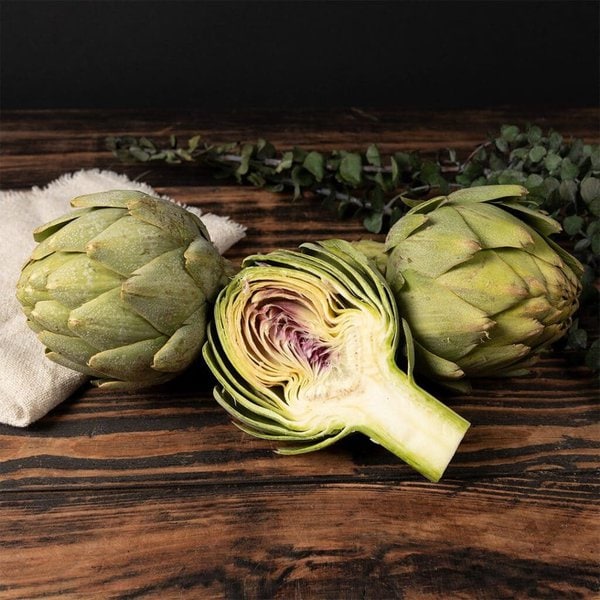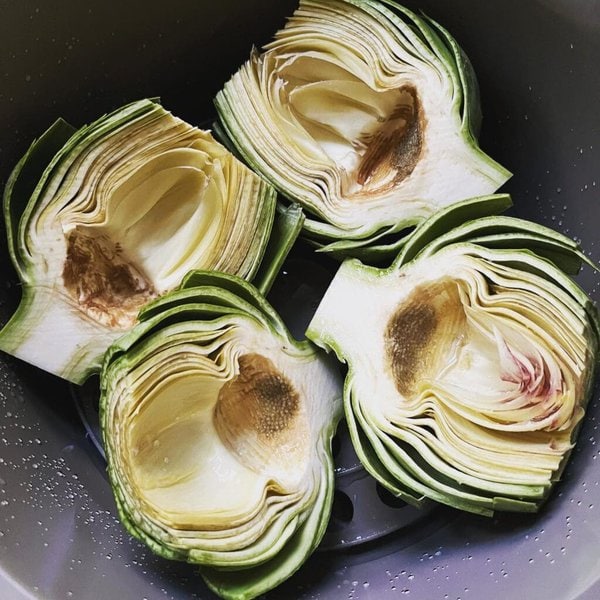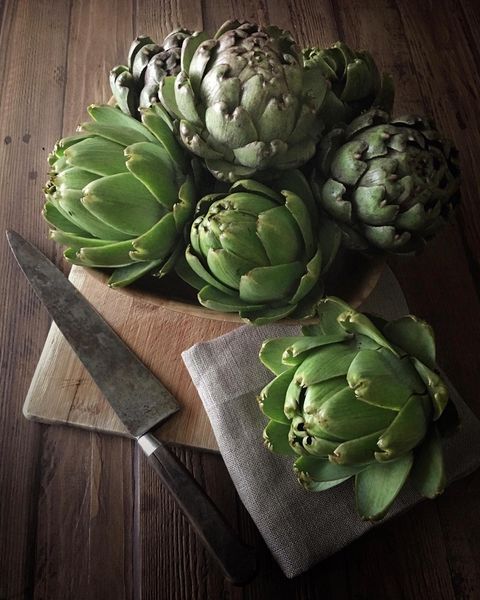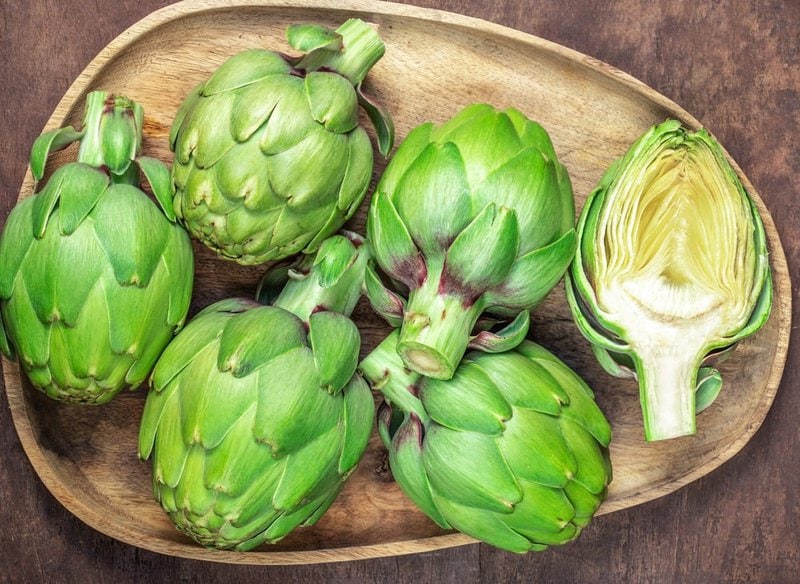There are plenty of foods we have to withhold from our canine buddies, and several dog owners are curious to know whether or not artichokes fall into the category of human foods that are safe for pooches to eat.
So, can dogs eat artichokes? Yes, dogs can eat artichokes, and even better, all parts of an artichoke – including the stem and leaves – are safe for a dog to consume. However, to ensure your fido’s well-being and optimum nutrition, artichokes must be fed to the dog in moderate amounts.
Contrary to popular opinion, artichokes are in no way toxic for dogs to eat when fed in moderation, and there are several health benefits to be derived from feeding this vegetable to your canine buddy, most of which are covered in this article.
However, like all other foods, feeding inappropriate amounts of artichokes to your dog can, indeed, result in health problems, and the dangers of overfeeding your canine buddy with artichokes are also well outlined in this article. However, before we take a look at all this, let’s have a look at why and when artichokes are considered safe for dogs to eat.
Can Dogs Eat Artichokes?

Yes, dogs can eat artichokes in moderation, provided it isn’t prepared with ingredients that can be detrimental to the pooch’s health.
Artichokes are immature buds of thistle plants that are typically cultivated and consumed as vegetables. The artichoke was initially cultivated for use as a medicinal plant, but over the years, it subsequently found its way into human cuisines, and inevitably, canine dishes.
Although this isn’t common knowledge, artichokes contain an incredible amount of healthy antioxidants – it will interest you to know that the United States Department of Agriculture (USDA) ranks cooked artichokes as one of the foods with the highest concentrations of antioxidants! And this is one of the reasons why this plant should absolutely be fed to dogs.
Artichokes are readily available at stores, and they offer an excellent, low-budget, nutrient-dense meal option for dogs to feast on. And even better, all parts of an artichoke – the stem, leaves, and heart – are safe for canine consumption.
How Can I Prepare Artichokes For My Dog To Eat?
Both raw and cooked artichokes are suitable for consumption by dogs. But to reduce the risk of your canine buddy suffering from digestive issues such as gas build-up in the stomach, it is advisable that you steam or boil artichokes before feeding them to the pooch.
When preparing artichokes for your dog to eat, it is important that you steer clear of adding ingredients such as salt and spices that are toxic for dogs. Artichokes prepared for human consumption typically contain these ingredients; Hence, it is equally crucial that you avoid feeding your canine buddy with human-grade artichokes.
Why Should I Feed My Dog With Artichokes?

Benefits attached to feeding dogs with artichokes include the presence of antioxidants, fiber, vitamins, and several minerals that are positively beneficial to canine health.
Artichokes Contain A Lot Of Antioxidants
Feeding your dog with artichokes, which typically contain a host of antioxidants, helps protect the pooch from oxidative damage to the cells caused by the presence of free radicals within the dog’s body system.
Additionally, antioxidants contained in artichokes help promote immune system activity, especially in older dogs, and can also be helpful in fighting off symptoms of canine allergies.
Artichokes Are Rich In Fiber
Apart from containing a lot of antioxidants, the high fiber content of artichokes can be highly beneficial to a dog’s digestive system. And for dogs suffering from diarrhea and constipation, feeding fiber-rich artichokes, which typically adds bulk and water to stool, can help alleviate the symptoms of the aforementioned medical conditions.
Additionally, fiber contained in artichokes can also serve as a probiotic by helping to maintain the PH balance of the canine digestive tract, thereby preventing the growth of harmful bacteria in the pooch’s guts.
Artichokes Contain Several Essential Vitamins
The importance of vitamins in maintaining the overall well-being of dogs can’t be overstated, and by feeding your canine buddy with artichokes, you’ll be granting the pooch access to these essential vitamins as well.
Artichokes are known for being rich in vitamins such as vitamin C and vitamin K, which contain antioxidant properties that enhance proper white blood cell functioning, as well as help dogs, recover from wounds and injuries.
Folate, which is a water-soluble vitamin B, also contained in artichokes, is important for:
- Generation of red blood cells in the bone marrow.
- Ensuring rapid growth of cells during canine pregnancy.
- Making use of amino acids to synthesize new proteins.
Artichokes Offer A Lot Of Beneficial Minerals
The presence of minerals such as potassium and magnesium in artichokes is another reason why you should consider adding this vegetable to your canine buddy’s diet.
Potassium is needed to regulate blood sugar levels in dogs, maintain homeostasis in pooches, and provide stability for neural functions in dogs.
Magnesium, on the other hand, aids the production of proteins, energy metabolism, maintenance of normal nerve and muscle function, and the regulation of blood glucose levels in dogs.
Can Artichokes Be Bad For Dogs?
Overfeeding a dog with artichokes can result in gastrointestinal upsets for the pooch, and the consumption of artichokes prepared with certain non-dog-friendly ingredients can develop into health complications for the pooch.
Gastrointestinal Upset
As beneficial as the high fiber content of artichokes can be to a pooch’s digestive system, the canine body can’t handle large amounts of fiber at once, and consuming an excessive amount of artichokes can result in the dog suffering a stomach upset.
Gastrointestinal upset, which arises from feeding a dog with artichokes, can be avoided by slowly introducing this vegetable into your dog’s diet, as well as feeding the dog with moderate amounts of the vegetable.

Feeding A Dog With Artichokes Prepared With Harmful Ingredients
Additionally, many artichoke dishes are prepared with ingredients, such as salt and garlic, that are toxic to dogs. And when fed with artichokes containing the ingredients mentioned above, a pooch can develop several health conditions.
It is thus recommended that you thoroughly check the product packaging before feeding your dog with artichokes to ensure that it hasn’t been prepared with any harmful ingredients. Alternatively, you can prepare artichokes for your dog to eat at home, where you have greater control and knowledge over the ingredients to use.
Bowel Obstruction
There is also a risk of intestinal blockages with artichokes, especially when this vegetable is being fed whole to the small dog breeds.
Intestinal blockages typically occur when artichokes are fed to dogs whole, without reducing them to bite-sized pieces. And a pooch suffering an intestinal blockage from being fed a whole artichoke will usually exhibit symptoms such as vomiting, weakness, diarrhea, bloating, and a subsequent loss of appetite.
Bowel obstruction in dogs is a medical emergency, and you should immediately get on the phone with your vet if you notice signs that suggest your canine buddy is suffering an intestinal blockage from being fed with artichokes.





